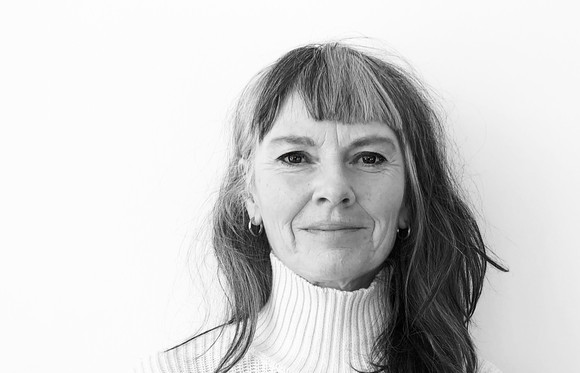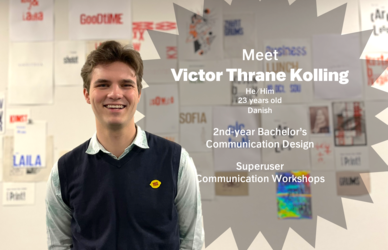French design researcher delivers strong messages
On a Wednesday morning in September the graduate students at Design School Kolding are standing in a circle in the front foyer of the school. They are reciting haiku poems to each other which they have written themselves; the topic of the poems is their future as designers. In the middle of the circle, listening intensely, stands Tiphaine Kazi-Tani, a researcher and teacher at the French design school ESADSE (Saint-Etienne Higher School of Art & Design).
Designers, not magicians
The creation of the short haiku poem is part of a larger message that the French design researcher wants to deliver to the students. Tiphaine Kazi-Tani’s research is exploring ways in which the design profession can oppose prevailing power structures in society; how designers and design educations, through their own methods, can resist industrial, political and economic power. The focus of the French researcher's visit to Design School Kolding is to get the students to think about what a designer really is and formulate new words to define a profession that, according to Tiphaine Kazi-Tani, is characterised by many fixed notions and discourses.
-The global perception of designers today is that we are some sort of magicians who can solve any problem by snapping our fingers and creating magic. I do not believe that immense problems like poverty and gender inequality are the designers' problems; they are political problems; they are everyone's problems. It’s unfair to ask designers to solve them, and few are capable of doing that. It's a matter of redefining what we can do, what we should do, what we should not do and express it in our own words, says Tiphaine Kazi-Tani.
The words of the French design researcher have resonated in the circle of graduate students. One of the students' haiku poems proclaims "Who asks the questions | If design is the answer | Rise, rebel, resist." In Design School Kolding's foyer there is a common feeling that designers should take charge.
Evading norms Tiphaine Kazi-Tani wants to use the day as a guest lecturer at Design School Kolding to tell the students that they should not succumb to norms, but rather set their own agenda.
- Design is already filled with established discourses that are very difficult to evade. Therefore we, as designers, must be very careful about using words that have come to ring a little hollow – words such as innovation, technology and sustainability. They may end up being clichés whose meaning we don’t think about. I would suggest to the students that they reflect on what their task and their purpose as designers is. They must try to liberate themselves from the discourses they are being dragged into and try to become more active in the definition of what they are able to do before an agenda that is not their own is being forced upon them, says Tiphaine Kazi-Tani.
Manifestos about own directions
Tiphaine Kazi-Tani also introduces the students to the concept of creating manifestos as a tool to inform others of their goals as designers. Such manifestos, says Tiphaine Kazi-Tani, will encourage the students to reflect deeply on their objectives as future designers.
- The idea of manifestos is that we want to challenge and dispute the inherent norms about design and ask ourselves if we really want to be part of that. A manifesto does not intend to persuade anyone; the purpose is to find like-minded people and send a signal that says – I am here and we can work together in this direction. It’s not important whether or not it’s the absolutely right direction. What matters is whether this is what you want to fight for, says Tiphaine Kazi-Tani.
If you have become curious about the students’ manifestos you can view all of them by following the link on the right.




